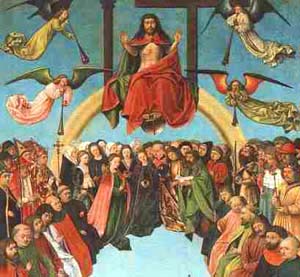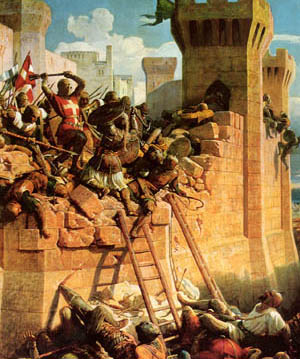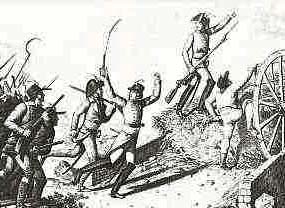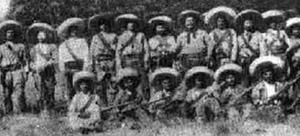 |
The Saint of the Day
All Saints Day – November 1
Prof. Plinio Corrêa de Oliveira

The congregation of the Blessed in Heaven.
Last Judgement 15th century, Staatliche Museum, Berlin |
What is the object of the All Saints Day? It is the veneration of all souls that are in Heaven, even if they are not officially canonized or beatified. Anyone who is in Heaven is a holy person. He or she is in the presence of God, sees God face-to-face, and is entirely pleasing to God.
Since it is impossible to know all these persons, whose number is uncountable, the Catholic Church cannot properly honor each one of these Saints by offering them a formal homage as she does with the canonized Saints. So, she instituted the feast of All Saints, a day on which she venerates them all.
It is good to pray to all these souls and ask their protection. There are, however, some of them – whose names we do not know – who have a special relation to our counter-revolutionary fight. Who are these souls? I will give you a sample list that you can add to as you will.

Above, Crusaders defending the city of Acre

Above, following some nobles, the peasants of the Vendée take up arms against the French Revolution. Below, Cristeros in Mexico in the 1930s
 |
How many crusaders died unknown fighting for the liberation of the Holy Land from the Muslim domination and went to Heaven? How many Catholics died fighting in Spain and Portugal during the war of the Reconquista? How many crusaders died fighting to conquer the pagan peoples of Northern Europe? All these were souls who understood in a special way the splendor of placing their force of arms at the service of the Faith, of sacrificing everything, including their own lives, for the victory of the Catholic Church.
There were souls like these who died in the Vendée in France and in the Carlista uprising in Spain. Also the San Credistas who fought against the Revolution in South Naples; the Pontifical Zouaves who heroically fought and died to keep the Papal States from falling into the hands of the partisans of Garibaldi; the Cristeros in Mexico, and so on. They are our brother souls who are in Heaven praying for those who continue their fight against the Revolution on earth.
Then there were those glorious ecclesiastics who fought against Freemasonry. I remember with special admiration Dom Vital Maria Gonçalves de Oliveira, Bishop of Olinda and Recife in Northeast Brazil, who forcefully combated Masonry, one of the most diabolic and dynamic agents of the Revolution. Also Msgr. Henri Delassus who wrote his famous La conjuration anti-chrétienne against Judaism and Masonry. They and many others spent their lives fighting against Masonry, and were persecuted, oppressed, and some of them even murdered. They also are our brother souls.
We cannot forget the cherished members of our families who preceded us in signum Fidei, in the sign of the Faith, and gained their eternal salvation. They are our special intercessors who love us and want to bring us ever closer to God to save our souls and be with them in Heaven. St. Therese of Lisieux had a beautiful veneration for her brothers who had died before the use of reason. She used to say that they were the saints of their family. Her family soon would produce a much greater saint, St. Therese herself.
We should pray specially to all these Saints on this feast day of theirs, since they are particularly open to hear us. We should ask them to help us accomplish on earth the vocation God gave us, and after that, to be with Him, Our Lady, and them in eternal glory.


  | | Prof. Plinio Corrêa de Oliveira | |
The Saint of the Day features highlights from the lives of saints based on comments made by the late Prof. Plinio Corrêa de Oliveira. Following the example of St. John Bosco who used to make similar talks for the boys of his College, each evening it was Prof. Plinio’s custom to make a short commentary on the lives of the next day’s saint in a meeting for youth in order to encourage them in the practice of virtue and love for the Catholic Church. TIA thought that its readers could profit from these valuable commentaries.
The texts of both the biographical data and the comments come from personal notes taken by Atila S. Guimarães from 1964 to 1995. Given the fact that the source is a personal notebook, it is possible that at times the biographic notes transcribed here will not rigorously follow the original text read by Prof. Plinio. The commentaries have also been adapted and translated for TIA’s site.
|
Saint of the Day | Home | Books | CDs | Search | Contact Us | Donate

© 2002- Tradition in Action, Inc. All Rights Reserved
|
 |

|